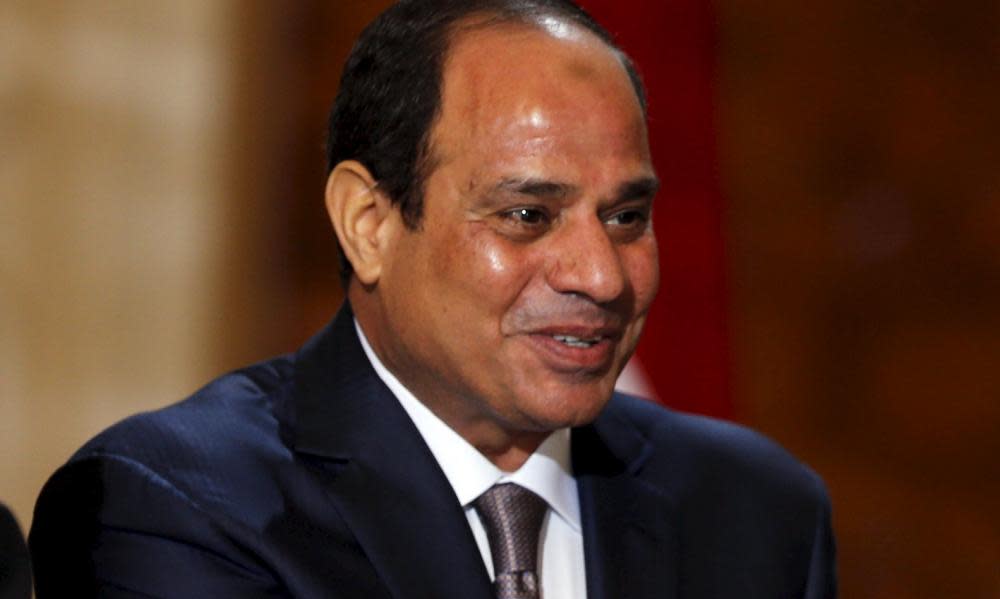Egyptians in Sinai living under siege due to anti-militant campaign, says HRW

The Egyptian government’s ongoing military campaign against Islamist militants in the Sinai peninsula has left citizens living under siege, according to Human Rights Watch.
In a new report published on Monday, the organisation states that up to 420,000 residents of four cities in north Sinai are now in urgent need of humanitarian aid due to shortages of food, medicine and other cooking essentials, as well as cuts to water, electricity, communications and freedom of movement.
The Egyptian military began a large-scale offensive against militants aligned to the Islamic State group in early February after the Egyptian president, Abdel Fatah al-Sisi, ordered the military to rid the peninsula of the insurgents within three months, in a speech last November. The command followed an attack on a mosque in north Sinai that killed over 300 people.
“It is your responsibility to secure and stabilise Sinai within the next three months,” Sisi told the military in February, adding: “You can use all brute force necessary.”
Yet testimony from local Sinai residents and activists as well as satellite footage, media reports and social media posts reviewed by Human Rights Watch attest that civilians in north Sinai are subject to a harsh crackdown that has led to a burgeoning humanitarian crisis.
“The military campaign against the Islamic State-affiliate in north Sinai has included imposing severe restrictions on the movement of people and goods in almost all of the governorate,” it said. The report details how citizens’ movements through major cities in Sinai are heavily curtailed due to the presence of military checkpoints at major roads, adding that Egyptian military has closed schools and universities due to the ongoing operation.
Residents from Sinai told the human rights organisation that soldiers besiege neighbourhoods when conducting house-to-house searches. The report adds that during these searches, “security forces seized all mobile phones, and sometimes laptops, computers, and other electronic devices, and did not return them”.
Ashraf Hefny, Sinai-based activist and coordinator with the local “people’s committee” of tribal leaders and activists, described the situation as a siege. He described how “commodities began to disappear gradually and [then] quickly” after service stations closed the night before the military operation began in February. Egyptian authorities have since banned the sale or use of petrol in northern Sinai, according to the report.
The government has also cut water and electricity, in an area already suffering from regular black- and brownouts, and cuts to internet and phone lines following a state of emergency imposed since 2014.
Human Rights Watch details how “the absence of sufficient government measures to deal with the food crisis has stirred fears and led to incidents of violence,” including the army shooting to disperse crowds of civilians gathering to buy food.
The Egyptian government has repeatedly touted the success of the operation in Sinai, claiming on 19 April that it had killed Nasser Abu Zaqul, the central Sinai commander of the Isis affiliate in Sinai, in a shootout. Independent observers and foreign media are banned from entering northern Sinai, making it impossible to independently verify the success of the ongoing military operation or its effect on the civilian population.
Egyptian military spokesman Col Tamer el-Refai declined to comment on the report before its publication. A spokesman for the Egyptian ministry of foreign affairs did not respond to a request for comment.
“As the Human Rights Watch report manages to document, the general population of north Sinai continues to be stuck in between the battle between Isis-Sinai and Egypt,” said Zack Gold, a Sinai expert with the Virginia thinktank CNA. “While Op Sinai 2018 could dismantle Isis’s Sinai chapter, the harsh treatment HRW documents waters the seeds of a future insurgent movement,” he said.

 Yahoo News
Yahoo News 
